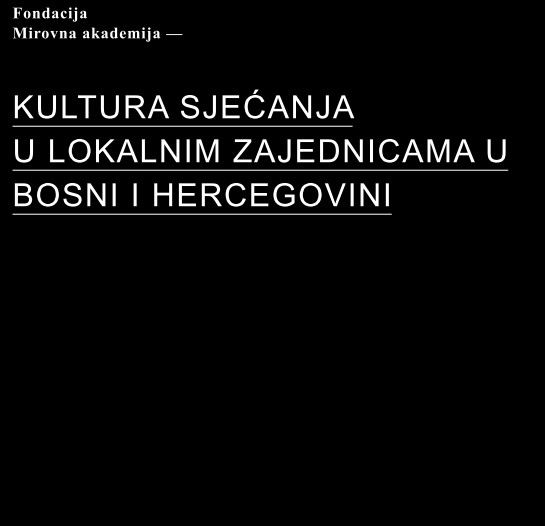The Peace Academy Foundation worked in cooperation with four research teams on a project called ‘Culture of Remembering in four local communities in Bosnia and Herzegovina’. This project researched what kind of culture of remembering on the war during ‘90s was established in four different communities in Bosnia and Herzegovina (BiH) and how these processes are interrelated with everyday life and social relations in these communities. Examining these links between the culture of remembering and everyday community life can give us a better understanding of today’s conflicts in society and helps to find constructive means for their transformation.
Two studies, one by the Nansen Dialogue Center (2010) and one by the Helsinki Citizens Assembly together with Žene Ženama (2008), showed that the lack of dialogue and common understanding about what happened during the war is one of the main drivers of conflict in BiH. The way in which a society remembers events from the violent past emerges as one of the key issues. Finding a more constructive approach to the culture of remembering is therefore an important, but understudied field, in peacebuilding and reconciliation.
There are at least four innovations in this project in relation to the majority of existing studies dealing with this or similar topics. First of all, culture of memory as a scientific field is a relatively new interdisciplinary field of study. Second, existing studies usually target big or prominent BiH cities such as Sarajevo, Mostar, Srebrenica or even more dominantly BiH in general. Within the current project, research was conducted in four concrete local communities, Foča, Velika Kladuša, Kiseljak and Konjic within the specific time frame. These communities are quite isolated from international and domestic civil society interventions and rather underrepresented in social research. Further, existing studies rarely employ fieldwork. In addition, they are usually done by international researchers. This project was fully conducted by local researchers who have their own and family war histories, where some even had personal relationships to the studied community. Accordingly, the project process had several phases (from educational to conducting fieldwork and writing the book chapters) and lasted for three years (2014 – 2017) and this was not an easy process for many of the researchers. The project thus had a strong process dimension.
The research findings are numerous and rich and only few of them will be outlined here. They demonstrate significant interrelation between official (war community) narratives on war and individual war narratives. In many of the communities, strong narratives of victimization exist and in all of them there is a deep fragmentation of memory narratives, similar to the three grander general national ethnic narratives. However, in some cases, for example in Velika Kladuša, some narratives about the war did not completely fit into these three national narratives, and they created some of their own. Dominant war narratives are often visible in public spaces (through monuments and other symbols) in a way which reflects power relationships within a community. Despite sharing patterns found among communities (victimization, conflicting narratives, the importance of multiple center-periphery relationships in reconstruction of dominant war narratives, prevalent silence about individual war experience, poor socio-economic conditions of today’s life as narrated by interlocutors, etc.) the book shows us how each community has its own specificities and trajectory in relation to the explored topic and how they need to be studied separately in order to understand present social relations and offer directions for conflict transformation.
The overall project led to the following outcomes: several pathways towards a constructive culture of remembering and promoting concrete actions were opened up. Some partnerships between and within targeted local communities were built and an improved critical comprehension and reflection on current practices and models of remembering work in BiH was established.


